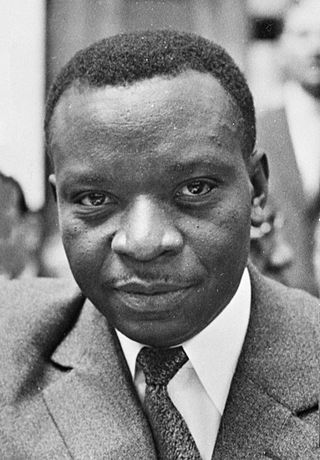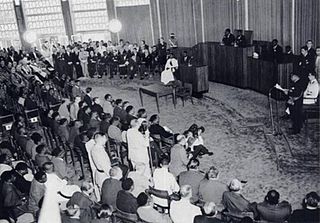Related Research Articles

Patrice Émery Lumumba, born Isaïe Tasumbu Tawosa, was a Congolese politician and independence leader who served as the first prime minister of the Democratic Republic of the Congo from June until September 1960, following the May 1960 election. He was the leader of the Congolese National Movement (MNC) from 1958 until his execution in January 1961. Ideologically an African nationalist and pan-Africanist, he played a significant role in the transformation of the Congo from a colony of Belgium into an independent republic.

Cyrille Adoula was a Congolese trade unionist and politician. He was the prime minister of the Republic of the Congo, from 2 August 1961 until 30 June 1964.

The Congolese National Movement is a political party in the Democratic Republic of the Congo.

General elections were held in the Belgian Congo on 22 May 1960, in order to create a government to rule the country following independence as the Republic of the Congo (Congo-Léopoldville), scheduled for 30 June. The 137-seat Chamber of Deputies was elected by men over the age of 21. The seats were filled by district-based lists, although only two parties, the Mouvement National Congolais-Lumumba (MNC-L) and the Parti National du Progrès, submitted lists in more than one district.

The Republic of the Congo was a sovereign state in Central Africa, created with the independence of the Belgian Congo in 1960. From 1960 to 1966, the country was also known as Congo-Léopoldville to distinguish it from its northwestern neighbor, which is also called the Republic of the Congo, alternatively known as "Congo-Brazzaville". In 1964, the state's official name was changed to the Democratic Republic of the Congo, but the two countries continued to be distinguished by their capitals; with the renaming of Léopoldville as Kinshasa in 1966, it became also known as Congo-Kinshasa. After Joseph Désiré Mobutu, commander-in-chief of the national army, seized control of the government in 1965, the Democratic Republic of the Congo became the Republic of Zaire in 1971. It would again become the Democratic Republic of the Congo in 1997. The period between 1960 and 1964 is referred to as the First Congolese Republic.

The Belgo-Congolese Round Table Conference was a meeting organized in two parts in 1960 in Brussels between on the one side representatives of the Congolese political class and chiefs and on the other side Belgian political and business leaders. The round table meetings led to the adoption of sixteen resolutions on the future of the Belgian Congo and its institutional reforms. With a broad consensus, the date for independence was set on June 30, 1960.

The Speech at the Ceremony of the Proclamation of the Congo's Independence was a short political speech given by Patrice Lumumba on 30 June 1960 at the ceremonies marking the independence of the Republic of Congo from Belgium. It is best known for its outspoken criticism of colonialism.

Jean Bolikango, later Bolikango Akpolokaka Gbukulu Nzete Nzube, was a Congolese educator, writer, and politician. He served twice as Deputy Prime Minister of the Republic of the Congo, in September 1960 and from February to August 1962. Enjoying substantial popularity among the Bangala people, he headed the Parti de l'Unité Nationale and worked as a key opposition member in Parliament in the early 1960s.
Joseph-Georges Kasongo was a Tanganyikan-born Congolese lawyer, businessman, and politician who served as the first President of the Chamber of Deputies of the Republic of the Congo. He later held office as a deputy prime minister and as a senator.

Jason Sendwe was a Congolese politician and a leader of the Association Générale des Baluba du Katanga (BALUBAKAT) party. He served as Second Deputy Prime Minister of the Democratic Republic of the Congo from August 1961 until January 1963, and as President of the Province of North Katanga from September 1963 until his death, with a brief interruption.
Maurice Mpolo was a Congolese politician who served as Minister of Youth and Sports of the Republic of the Congo in 1960. He briefly led the Congolese army that July. He was executed alongside Prime Minister Patrice Lumumba in Katanga in 1961.

The Lumumba Government, also known as the Lumumba Ministry or Lumumba Cabinet, was the first set of ministers, ministers of state, and secretaries of state that governed the Democratic Republic of the Congo under the leadership of Prime Minister Patrice Lumumba from 24 June until 12 September 1960. The government inherited many problems from the era of the Belgian Congo, a tightly administered colony which for most of its existence had few political freedoms. Its members came from different social classes, different tribes, and held varied political beliefs. Weak and divided, its tenure was dominated by a widespread mutiny in the army and two secessions. An exodus of thousands of Belgian functionaries—who had controlled most of the bureaucracy—left the administration in disarray. The United Nations created a large multinational peacekeeping force to assist the government in reestablishing law and order. Western nations were under the impression that Lumumba was a communist, and the United States, Belgium, and France all worked to undermine and divide his government. Domestic opposition to the government cemented by late July, and Lumumba increasingly relied on only a few advisers, and rarely consulted the full Council of Ministers; several members of the government began acting without his direction. He resorted to increasingly authoritarian measures to maintain control over the country.
Grégoire Kamanga was a Congolese politician who twice served as Minister of Public Health of the Republic of the Congo. He also founded the Coalition Kasaïenne and served as Provincial President of Unite-Kasaïenne.
Rémy Mwamba (1921–1967) was a Congolese politician who twice served as Minister of Justice of the Democratic Republic of the Congo. He was also a leading figure of the Association Générale des Baluba du Katanga (BALUBAKAT).
Joseph Bonaventure Lutula La Puku Pene Omasumbu was a Congolese politician who served as Minister of Agriculture of the Democratic Republic of the Congo in 1960. He reassumed the post in 1961 and held it until April 1963, when he was appointed Minister of Middle Classes and Community Development. He resigned from the government that September. He died in 2008.

Jean-Pierre Finant was a Congolese politician who served as the first President of Orientale Province in the Democratic Republic of the Congo from June until October 1960.
Aloïs Kabangi Kaumbu was a Congolese politician. He served as Minister of Economic Coordination and Planning of the Republic of the Congo from June to September 1960 and again from February 1961 to July 1962.

The Lumumba Government was the first set of ministers, ministers of state, and secretaries of state that governed the Democratic Republic of the Congo under the leadership of Prime Minister Patrice Lumumba from 24 June until 12 September 1960. It was hastily formed over the period of several weeks in June, and was supported by a slight majority coalition in Parliament. Weak and divided, its tenure was dominated by a widespread mutiny in the army and two secessions.
Joseph Mbuyi was a Congolese politician. He served as the Minister of Middle Classes of the Republic of the Congo in 1960.
In August 1960 troops of the Republic of the Congo attempted to crush the secession of South Kasai by invading the declared state's territory. Though initially militarily successful, the attack faltered under intense international and domestic political scrutiny and the Congolese troops were withdrawn.
References
- Kanza, Thomas R. (1994). The Rise and Fall of Patrice Lumumba: Conflict in the Congo (expanded ed.). Rochester, Vermont: Schenkman Books, Inc. ISBN 978-0-87073-901-9.
- Lemarchand, Rene (2021). Political Awakening in the Congo: The Politics of Fragmentation (reprint ed.). University of California Press. ISBN 9780520365247.
- Merriam, Alan P. (1961). Congo: Background of Conflict. Evanston, Illinois: Northwestern University Press. OCLC 424186.
- Vanderstraeten, Louis-François (1993). De la Force publique à l'Armée nationale congolaise: histoire d'une mutinerie, juillet 1960 (in French) (reprint ed.). Brussels: Académie royale de Belgique. ISBN 9782803101047.
- Young, Crawford (1965). Politics in the Congo: Decolonization and Independence. Princeton: Princeton University Press. OCLC 307971.
- Zeilig, Leo (2015). Lumumba: Africa's Lost Leader (revised ed.). Haus Publishing. ISBN 9781908323958.
